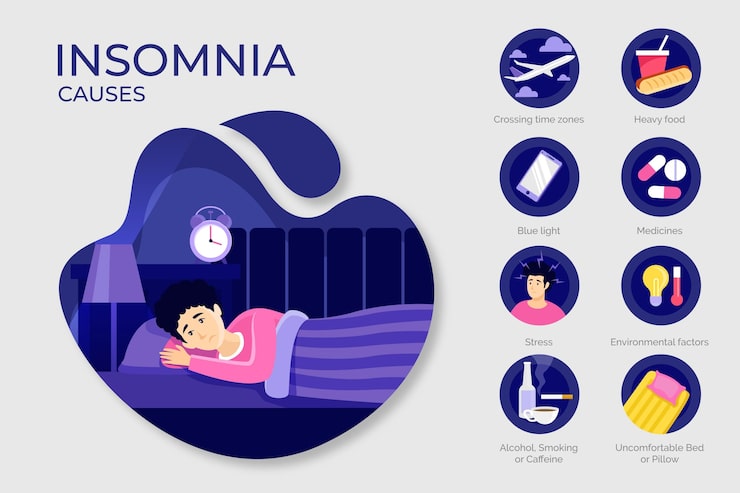
Woman who is not able to sleep
Insomnia is one of the sleep disorders that can make it hard to fall asleep or stay asleep. It also affects the time you wake up, making it too early and preventing you from falling back asleep. It takes away the rested feeling one usually feels after a proper night’s sleep by draining one’s energy and taking away the ability to feel well rested. Safe to say, it has drastic effects on how we function throughout the day, affecting work performance, quality of life, and overall health.
Many people face difficulty at least once throughout their adult life due to life circumstances. This usually lasts for a short period and isn’t qualified as a disorder. However, when the same patterns are observed for a long time, it is identified as insomnia. While insomnia isn’t life-threatening, it can affect one’s quality of life immensely and even lead to life-threatening
mental health problems.
The symptoms of insomnia cover everyday occurrences. However, when observed over
time, they might be an indicator of a chronic problem. These symptoms include:
Being unable to fall asleep at night and staying awake for long hours into the night, even after trying to sleep, could be a sign of insomnia.
Randomly waking up in the middle of the night consistently might be a sign that you have insomnia.
Waking up early is usually considered a good habit, but waking up too early without getting the required amount of sleep chronically might be a sign of insomnia.
Constantly feeling drained of energy and sleepy during the day might be a telltale sign of insomnia.
Being awfully alert, easily frustrated, and frequently low for long periods is a symptom of insomnia.
Being constantly distracted, not being able to focus on tasks, and remembering over a long period are symptoms of insomnia.
Regularly facing accidents in a higher density for an extended period might be a sign of insomnia.

Illustration with causes of insomnia
There is no concrete reason behind the existence of insomnia, but it is understood that it can occur for many reasons. Whether these reasons are simply factors or the cause is unknown. However, most cases of insomnia occur due to stress, major life events, and long-term sleep patterns. The common symptoms include:
Constant or immense stress can cause significant damage to your health, consistent irregularity in your sleep pattern might be an indicator of an overburden of stress in your life.
Long travel periods cause a lot of trauma to the body and mind due to the change in location, climate, and usual displacement.
Sleep habits that do not allow you to get the required amount of consistent sleep lead to long-term effects on your sleep pattern and circadian rhythm.
The presence of a disturbed mind is often accompanied by sleeplessness and other sleep disorders.
Many medicines interfere with our body’s natural system and cause sleeplessness as a side effect. Medicines can also cause irregular sleep due to specific properties.
Chronic diseases are usually accompanied by irregular sleep patterns due to other imbalances in the body, which are a prerequisite condition of long-term diseases.
Constant or over consumption of stimulants such as caffeine, nicotine, and alcohol leads to long-term disturbance in the system of our bodies. This can lead to insomnia.
Genetics is a key player sometimes when it comes to insomnia.
Major life events can disturb the mind and body, causing insomnia.
Lack of sleep can cause many problems, including an increased risk of many health conditions. These conditions can lead to life-threatening circumstances in some cases.
These conditions are:

Healthy woman who is smiling
Though there are many ways to manage insomnia short-term with ease, for long-term results, you would need to make significant life changes to your routine.
Some ways to improve your sleep habits are:
If a person's insomnia is not fixed by trying to improve their lifestyle, they should contact a doctor for treatment and guidance.
Insomnia is one of the sleep disorders that can make it hard to fall asleep or stay asleep.
There is no concrete reason behind the existence of insomnia, but it is understood that it can occur for many reasons.
Symptoms of insomnia include long-term disturbances in sleep patterns, inability to pay attention, and proneness to accidents.
While insomnia is a long-term problem, it can be fixed with some attention to daily habits, along with consistency.
Treatments for insomnia include a change in lifestyle, such as regular exercise, a strict sleep schedule, avoiding stimulants, and more.
Insomnia can lead to many problems in the daily life of a person, like depression, anxiety, high blood pressure, and even heart attacks.
We offer expert care across key specialties, including Medicine, Cardiology, Orthopaedics, ENT, Gynaecology, and more—delivering trusted treatment under one roof.
Prakash Hospital Pvt. Ltd. is a 100 bedded NABH NABL accredited multispecialty hospital along with a center of trauma and orthopedics. We are in the service of society since 2001.
OUR SPECIALITIES
Contact Us
D – 12A, 12B, Sector-33, G. B. Nagar, Noida, Uttar Pradesh 201301
+91-8826000033

© 2025 All rights reserved.
Designed and Developed by Zarle Infotech